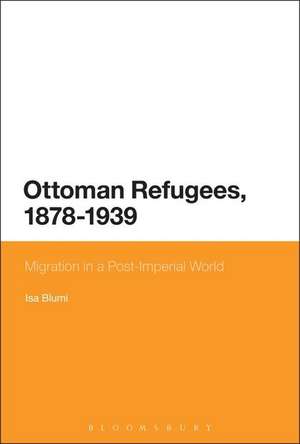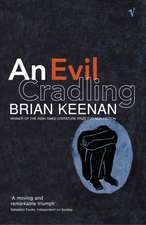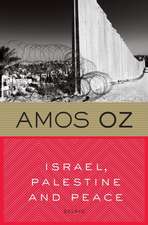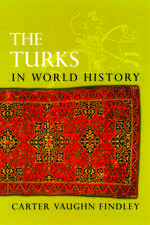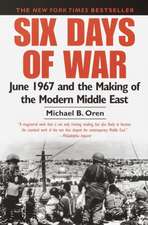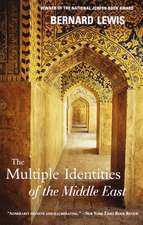Ottoman Refugees, 1878-1939: Migration in a Post-Imperial World
Autor Isa Blumien Limba Engleză Hardback – 11 sep 2013
| Toate formatele și edițiile | Preț | Express |
|---|---|---|
| Paperback (1) | 258.59 lei 6-8 săpt. | |
| Bloomsbury Publishing – 25 mar 2015 | 258.59 lei 6-8 săpt. | |
| Hardback (1) | 833.47 lei 6-8 săpt. | |
| Bloomsbury Publishing – 11 sep 2013 | 833.47 lei 6-8 săpt. |
Preț: 833.47 lei
Preț vechi: 1198.41 lei
-30% Nou
Puncte Express: 1250
Preț estimativ în valută:
159.49€ • 166.86$ • 132.48£
159.49€ • 166.86$ • 132.48£
Carte tipărită la comandă
Livrare economică 02-16 aprilie
Preluare comenzi: 021 569.72.76
Specificații
ISBN-13: 9781472515360
ISBN-10: 1472515366
Pagini: 296
Ilustrații: 10 bw illus
Dimensiuni: 156 x 234 x 23 mm
Greutate: 0.59 kg
Ediția:New.
Editura: Bloomsbury Publishing
Colecția Bloomsbury Academic
Locul publicării:London, United Kingdom
ISBN-10: 1472515366
Pagini: 296
Ilustrații: 10 bw illus
Dimensiuni: 156 x 234 x 23 mm
Greutate: 0.59 kg
Ediția:New.
Editura: Bloomsbury Publishing
Colecția Bloomsbury Academic
Locul publicării:London, United Kingdom
Caracteristici
Contributes to understanding the role of refugees and diasporas in world, regional and national histories
Notă biografică
Isa Blumi is Senior Research Fellow at the Centre for Area Studies, Leipzig University, Germany and Associate Professor of History at Georgia State University, USA.
Cuprins
Introduction 1 Prelude to Disaster: Finance Capitalism and the Political Economy of Imperial Collapse 2 Resettlement Regimes and Empire: The Politics of Caring for Ottoman Refugees 3 Traveling the Contours of an Ottoman Proximate World 4 Transitional Migrants: The Global Ottoman Refugee and Colonial Terror 5 Missionaries at the Imperial Ideological EdgeConclusionNotesBibliographyIndex
Recenzii
Blumi (Georgia State Univ., Reinstating the Ottomans, 2011) has written a very sophisticated analysis of refugees during the late- and post-Ottoman periods that shows the complexities of refugee identity within the empire. In doing so, he recognizes the role played by the linguistic, religious, and ethnic diversity of these people, which at times finds the various interests and identities of refugees pitted against each other. Throughout the work, Blumi highlights the trauma of the Ottoman refugee studies, it gives the readers a larger perspective of the refugee experience, not one limited geographically or otherwise. Blumi, whose vast linguistic abilities allow him to reach across the empire from Albania to Yemen, adds a much-needed theoretical foundation to the study of Ottoman refugees. He shows how refugees in their struggle to survive were forced to contend with the interests of global capitalism in both the nation-states arising from the Ottoman Empire and elsewhere, especially Latin America. Valuable for students of Ottoman history as well as most general refugee studies. Summing Up: Highly recommended.
This study examines many refugee groups and geographic regions and taps into multiple historiographical debates, whether on violence, integration, or Subaltern agency. The unifying theme of global capitalism holds these eclectic pieces together very well in a complicated narrative. This thought-provoking work should be of interest not only to Ottoman and Middle Eastern specialists but also to theorists in refugee studies, world historians, and students of global capitalism.
Blumi's book is a valuable contribution to Ottoman studies . It addresses issues that had been only occasionally scrutinized, and it provides valuable insights. It is also an effort to 'deorientalize' and 'de-provincialize' the Ottoman Empire. The account is also a global history. Addressing international networks and connections, it breaks down national borders that still continue to shape historians' perceptions, consciously or unconsciously.
This study examines many refugee groups and geographic regions and taps into multiple historiographical debates, whether on violence, integration, or Subaltern agency. The unifying theme of global capitalism holds these eclectic pieces together very well in a complicated narrative. This thought-provoking work should be of interest not only to Ottoman and Middle Eastern specialists but also to theorists in refugee studies, world historians, and students of global capitalism.
Blumi's book is a valuable contribution to Ottoman studies . It addresses issues that had been only occasionally scrutinized, and it provides valuable insights. It is also an effort to 'deorientalize' and 'de-provincialize' the Ottoman Empire. The account is also a global history. Addressing international networks and connections, it breaks down national borders that still continue to shape historians' perceptions, consciously or unconsciously.
